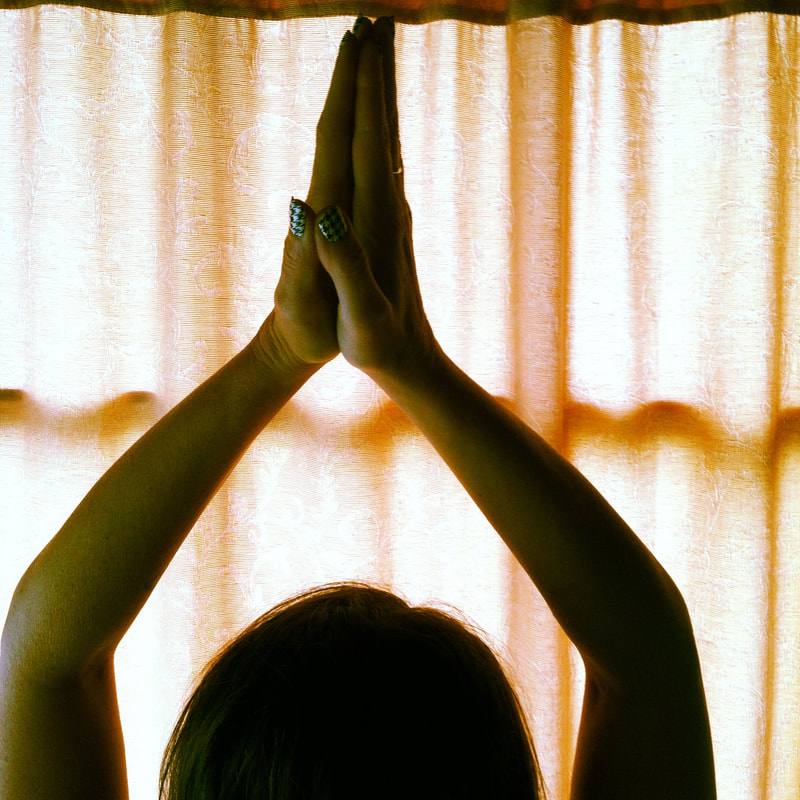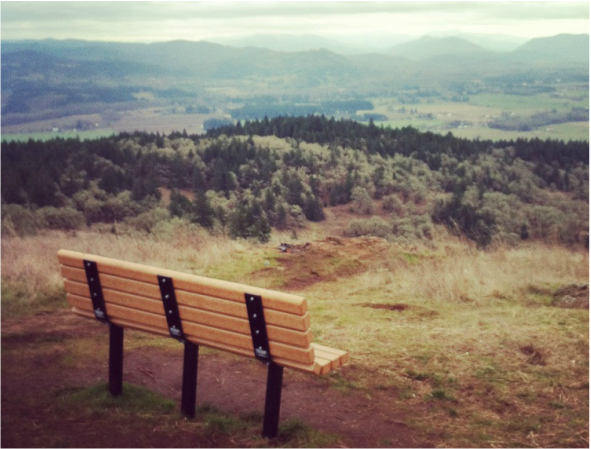|
The other day I hiked up a small butte in the middle of town. It was a beautiful sunny day. The weather was comfortably warm, the grass gently blowing in the breeze. I lay down on a bench to take in the moment. A feeling of contentment washed over me. I realized that in that moment, I was at peace. I was content.
I was reminded of other times in my past when I had felt this same sense of peace and contentment. The memories that came to me were small snippets of time. I remembered the sound of church bells on a lazy summer afternoon, the smell of a BBQ going, a smooth blanket of snow shining in the sun, a moment of laughter with a friend. I did not think of money or status or people’s recognition and approval of me. I realized that my moments of feeling most content were simple moments of time when I was fully present. When we are asked what will make us happy, we come up with answers like; more money, a stable job, a spouse, having kids, owning a house, moving to a different place, getting more respect at work, etc. etc. We are always looking for contentment in things that we don’t yet have, things we think we lack, things just beyond reach. We don’t often realize that contentment is available to us at every moment, whoever we are, wherever we are and whatever situation we are in. Some may say this isn’t possible, that you cannot find peace in any and every situation. Yet, isn’t it our perceptions that create the idea that something will bring us happiness? It is not a FACT that marriage or money or a “dream” job will bring happiness. Most of us find that out along the way, and yet we continue to believe that the next thing will gift us contentment. Our expectations and beliefs, not facts, create this illusion that we fall into over and over. We can spend our entire lives falling into the hole of searching for contentment, or we can notice that happiness is not something that comes to us from the outside, but something that we find within. It is there for us, all of the time, in the beauty of the moment. This week ask yourself where you expect contentment to come from? Where are you investing yourself to try and find happiness? What would shift if you were to look for contentment in the small moments of your life? Autobiography in Five Short Chapters by Portia Nelson I I walk down the street. There is a deep hole in the sidewalk. I fall in. I am lost … I am helpless. It isn’t my fault. It takes me forever to find a way out. II I walk down the same street. There is a deep hole in the sidewalk. I pretend I don’t see it. I fall in again. I can’t believe I am in the same place but, it isn’t my fault. It still takes a long time to get out. III I walk down the same street. There is a deep hole in the sidewalk. I see it is there. I still fall in … it’s a habit. my eyes are open I know where I am. It is my fault. I get out immediately. IV I walk down the same street. There is a deep hole in the sidewalk. I walk around it. IV I walk down another street.
0 Comments
 Limitation is defined as; a bound, a restriction. In our present day culture, we are faced with limitations all the time. In both our personal and professional worlds, we live in a maze of due dates, physical restrictions, rules, laws and unspoken boundaries. These limitations are sometimes imposed by us, but more often than not, they are imposed upon us by culture, history, religion, society, family and other institutions. Whether or not we agree with certain restrictions, there are sometimes grave consequences for trespassing or ignoring them. Limitations can serve to make us feel safe and ordered, but they can also make us feel suffocated, controlled and stressed. Many times, we approach these limitations from opposite ends. Either we sit comfortably and complacently behind these restrictions, too afraid or too apathetic to question them, or else we blow through them with defiance and anger, usually reaping personal consequences and conflict. The purpose of restrictions is to keep things ordered and effective for a determined outcome. Even our physical limitations make it possible for us to move with strength and speed. But is it possible that our limitations, self-imposed or not, can have a higher purpose of teaching us something? Of setting our spirits free? Buddhists traditionally practice a form of self-discipline using established rules or precepts. Gaining mastery over oneself and one’s desires is seen as a step along the road to enlightenment, to freeing the self. Similarly, other religions such as Christianity and Islam have teachings centered around self-discipline. These restrictions are a means to perfecting the soul and becoming closer to Divinity. In our daily lives, limitations and restrictions can cause us to feel insecure when we don’t meet them, suffocated when we feel pinned down by them and angry or helpless when we feel they are unjust or ineffective. They bring up raw emotions within us; material for self-awareness. Our relationship to restrictions is an indication as to what we are called to work on in our personal development. In yoga, physical limitations often bring up emotional restrictions. Insecurity, frustration, anger, disappointment, shame. This is the material to be worked on in a yoga practice. Carefully, intentionally and kindly noticing these restrictions, exploring our “edges,” becoming curious and self aware of our own experience. Yoga teaches us to respect these edges, yet to explore them and possible move them slowly over time. It is only with complete awareness, patience and acceptance of our restrictions that we can learn to expand them. This week ask yourself what restrictions you may be fighting in your life right now. What limitations are you being asked to explore and accept in order to do the higher work of moving your spirit? |
The Spirit of TherapyWhere psychotherapy interacts with our mental, emotional, spiritual, physical and relational wellbeing. Categories
All
Archives
December 2014
|

 RSS Feed
RSS Feed